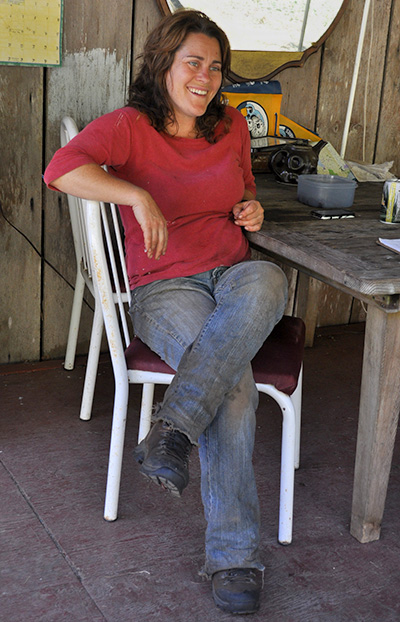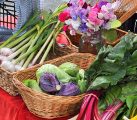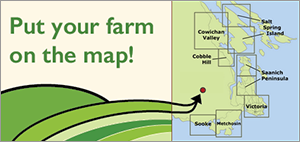Who Are the 21st Century Farmers?
British Columbia’s Agricultural Future

Candace Thompson of Eagle Paws Organics in Sooke is one of a growing number of women farmers in BC.
A new report from Statistics Canada provides a snapshot of farmers and farming in Canada. In a year that has seen baby boom generation farmers retire at a rapid rate, it comes as no surprise that the average age of farmers in Canada is 55-years-old. Nationwide in 2016, older farmers, 55 to over 75 years old, comprised the largest share of farm operators.
In British Columbia, where the local food movement is growing, Statistics Canada’s latest profile of BC agriculture provides a window into trends that are shaping 21st century farming.
Most notable, perhaps, is that of all the provinces in Canada, BC has the largest proportion of small farms—nearly 42 percent. Almost half of BC’s small farms sell directly to the public.
Also of interest is the increasing number of women farmers. BC has the highest proportion (37.5%) of female farmers in Canada, and is changing the face of what we think of when we picture North American farmers.
Finally, in a hopeful sign for the future, for the first time since 1991, Canada had a small but significant increase in the percentage of farmers under age 35. In British Columbia, young farmers now comprise 6.9% of the total farmers (compared to just 5.4% in 2011).
Clearly, even with this small positive increase, the necessary passage of BC’s farmland to a new, younger generation is in serious trouble. A major retirement of older generation farmers is already underway. Without policies, training and support to transition new farmers onto the land, agricultural lands will be lost and the chance for local food security—our ability to produce and control our own food supply—will go with them.
So, it’s worth taking a look at who the new generation of farmers are and how they are changing the face of 21st century farming.
Who are the New Farmers?
 • New farmers are often first-generation, starting from scratch rather than taking over a family farm.
• New farmers are often first-generation, starting from scratch rather than taking over a family farm.
• They are hard-working, passionate about the land and enthusiastic about creating a new agricultural model based on sustainability and respect for the land and animals.
• They come from urban settings, often leaving jobs in large organizations with the desire to connect back to the natural world. Some have a farming background but many have no roots in the country.
• Many are college-educated and enter farming with the aim of practicing sustainable organic diversified farming and direct marketing their products.
• Many have moved away from traditional agricultural models requiring capital intensive inputs for land and equipment. The new farmer is lean—leasing land, using ingenuity and scrounging when possible to lower costs, connecting through social media, and marketing directly to consumers by emphasizing no-pesticide farming methods and local sustainability.
• They are looking for new ways to work together: co-operative farming, small distribution networks, shared farm equipment and food storage areas, and joint commercial kitchens for the preparation of value-added products.
• Some are choosing innovative low-overhead business models like shipping container farms or urban grow bag farms. In the process, they’re changing our ideas about what constitutes a farm.
Challenges Facing Young Farmers
New farmers in British Columbia face a variety of challenges:
• Access to land – Very high land prices in BC—often driven by uncontrolled investor speculation—make it prohibitive for young people with little means to buy land. Older farmers understandably want a high buyout after a lifetime of hard work, but failure to pass BC’s vital and limited farmland to a new generation is too high a price to pay.
According to the 2016 census, just 8.4% of agricultural operations in Canada have a written succession plan for transfer of ownership and control of their farms to another person. In other words, with the majority of Canadian farmers over age 55 and nearing retirement, there are virtually no succession plans for Canadian farms.
The BC government needs to create new flexible financing models for farm transitions. It is vital to BC’s food security to protect and retain agricultural lands, especially those adjacent to urban areas.
 • Access to capital – Banks generally will not lend young people the large amounts of money needed to buy an existing farm or start a new one. If an interested potential farmer cannot borrow sums—often in excess of a million dollars or more—he or she will not be able to buy a farm.
• Access to capital – Banks generally will not lend young people the large amounts of money needed to buy an existing farm or start a new one. If an interested potential farmer cannot borrow sums—often in excess of a million dollars or more—he or she will not be able to buy a farm.
• Zoning regulations that prohibit non family land transfers or multi-family occupancy of land do not allow for the kind of flexible solutions cash-strapped beginning farmers need. Local municipalities need to adopt new regulations to allow co-operative farming, co-housing farm communities, and other models that allow unrelated people to join together and farm.
• Lack of training – Universities and colleges need to offer more training in diversified, sustainable agriculture. The traditional way of gaining farming knowledge—by growing up on a farm, learning it as you grew, and then taking over—is largely gone. New farmers, even those who have some family farming experience, face a large learning curve when it comes to starting and managing a farming operation. Attracted by the rural life and crop cultivation, new farmers find they also need to be experts at marketing and business management. Young would-be farmers need training programs to help them into the kind of agriculture they’re looking for: small, diversified, sustainable farms.
With the majority of Canadian farmers over age 55 and nearing retirement, there are virtually no succession plans for Canadian farms.
How BC Can Transition its Farmland
Looking at the demographics and the obstacles new farmers face, the risk is clear. If a new generation of farmers cannot transition onto the land, BC’s food security will be lost.
Fortunately, thanks to the Agricultural Land Reserve, British Columbia still has a large part of its available farmland intact. Non-agricultural development, however, has greatly eroded the use of these lands.

The direction for British Columbia is clear: Manage the transition of farmland with the goal of long-term food security, increased agricultural employment, and environmental sustainability.
The direction for British Columbia is clear: Manage the transition of farmland as a provincial responsibility with the overriding social goals of long-term food security, increased agricultural employment, and environmental sustainability.
This means revitalizing the Agricultural Land Reserve and reducing non-farm uses in it. It also means creating a regulatory and financial program that allows a new generation of farmers to inherit the land, while rewarding the older generation for their hard work and stewardship of our common and critical agricultural heritage.
More articles:
 Can Local Agriculture Drive Economic Development?
Can Local Agriculture Drive Economic Development?
 How Oregano Can Help Fight Global Warming:
How Oregano Can Help Fight Global Warming:
Culinary Herb Reduces Greenhouse Gas Emissions











Thank you for this article! I am also a young female farmer in Sooke that has started a farm from the beginning on non farm land with my young family. It has been an incredible financial and physically intensive period getting WildWoods going but at the end of the day to know we are feeding our family and others makes it all worth the hard work. We need more small farms for for security and diversity. Thank you for all other farms and those that support them!
Kristy Sivorot
WildWoods Farm, Sooke, BC
Wonderful article. Keep them coming. Your words are right on.
This news and commentary must be a mainstay of readers…reduce the myths of: no young people on the land; you can’t make a living at farming (often not, in some cases, but secondary income is very worthwhile and some do make a living); young people cannot buy farmland, really it’s some young people cannot buy/acquire farmland – but many do own farms.
Local produce this year 2017 is flying out the gates!